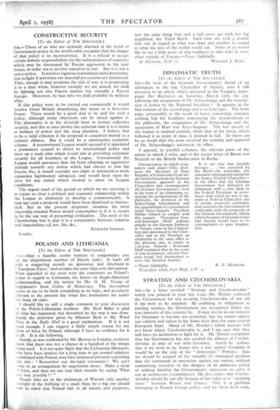POLAND AND LITHUANIA
[To the Editor of THE SPECTATOR.]
SIR,—May a humble reader venture to congratulate you on the magnificent number of March 25th ? It leads off with a staggering assault on ignorance and falsehood in " European Facts," and sustains the same high note throughout.
What appealed to me most were the comments on Poland's action in regard to Lithuania, the letters on Anglo-American understanding, and the review by Mr. G. M. Young of Lippincott's book Critics of Democracy. The last-named ,eems to me to be both compelling in its logic, and peculiarly relevant to the present day when free institutions are under fire from all sides.
I should like to add a single comment to your discussion of the Polish-Lithuanian incident. Mr. Noel Baker is glad of what has happened, but disturbed by the way it was done. Surely the interview given by Minister Beck to Mr. Ward Price in the Daily Mail is a good explanation. If it is not good enough, I can suggest a fairly simple reason for the ,how of force by Poland, although I have no evidence for it at all. It is the following.
Surely, as was confirmed by Mr. Hoover in London, everyone knew that there was not a chance in a hundred of the troops being used: Is it not quite likely that the Lithuanian Ministers, .vho have been anxious for a long time to get normal relations :stablished with Poland, may have intimated privately something ike this : " Remember our die-hard extremists ! We can't ome to an arrangement by negotiation alone,- Make a show
∎ f force, and then we can stop their mouths by saying 'What _Ise was possible ? ' "
People who see in the ultimatum of Warsaw only another xample of the bullying of a small State by a big one should bear in mind that Poland did, to all intents and purposes, just the same thing four and a half years ago with her big neighbour, the Third Reich. Each time she took a double risk, one in regard to what was done and another in regard to what the rest of the world would say. Some of us would like to see a little more of that readiness to take risks in some other capitals of Europe.—Yours faithfully,














































 Previous page
Previous page